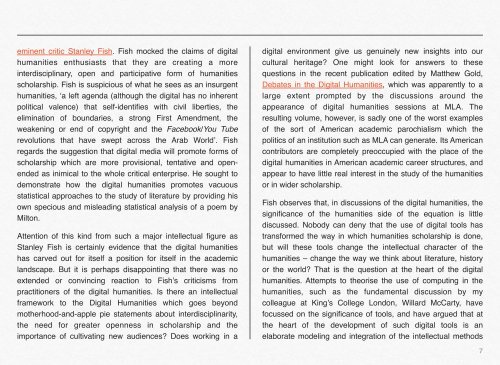Digital Arts & Humanities - Scholarly Reflections - James O'Sullivan
Digital Arts & Humanities - Scholarly Reflections - James O'Sullivan
Digital Arts & Humanities - Scholarly Reflections - James O'Sullivan
You also want an ePaper? Increase the reach of your titles
YUMPU automatically turns print PDFs into web optimized ePapers that Google loves.
eminent critic Stanley Fish. Fish mocked the claims of digital<br />
humanities enthusiasts that they are creating a more<br />
interdisciplinary, open and participative form of humanities<br />
scholarship. Fish is suspicious of what he sees as an insurgent<br />
humanities, ‘a left agenda (although the digital has no inherent<br />
political valence) that self-identifies with civil liberties, the<br />
elimination of boundaries, a strong First Amendment, the<br />
weakening or end of copyright and the Facebook/You Tube<br />
revolutions that have swept across the Arab World’. Fish<br />
regards the suggestion that digital media will promote forms of<br />
scholarship which are more provisional, tentative and openended<br />
as inimical to the whole critical enterprise. He sought to<br />
demonstrate how the digital humanities promotes vacuous<br />
statistical approaches to the study of literature by providing his<br />
own specious and misleading statistical analysis of a poem by<br />
Milton.<br />
Attention of this kind from such a major intellectual figure as<br />
Stanley Fish is certainly evidence that the digital humanities<br />
has carved out for itself a position for itself in the academic<br />
landscape. But it is perhaps disappointing that there was no<br />
extended or convincing reaction to Fish’s criticisms from<br />
practitioners of the digital humanities. Is there an intellectual<br />
framework to the <strong>Digital</strong> <strong>Humanities</strong> which goes beyond<br />
motherhood-and-apple pie statements about interdisciplinarity,<br />
the need for greater openness in scholarship and the<br />
importance of cultivating new audiences? Does working in a<br />
digital environment give us genuinely new insights into our<br />
cultural heritage? One might look for answers to these<br />
questions in the recent publication edited by Matthew Gold,<br />
Debates in the <strong>Digital</strong> <strong>Humanities</strong>, which was apparently to a<br />
large extent prompted by the discussions around the<br />
appearance of digital humanities sessions at MLA. The<br />
resulting volume, however, is sadly one of the worst examples<br />
of the sort of American academic parochialism which the<br />
politics of an institution such as MLA can generate. Its American<br />
contributors are completely preoccupied with the place of the<br />
digital humanities in American academic career structures, and<br />
appear to have little real interest in the study of the humanities<br />
or in wider scholarship.<br />
Fish observes that, in discussions of the digital humanities, the<br />
significance of the humanities side of the equation is little<br />
discussed. Nobody can deny that the use of digital tools has<br />
transformed the way in which humanities scholarship is done,<br />
but will these tools change the intellectual character of the<br />
humanities – change the way we think about literature, history<br />
or the world? That is the question at the heart of the digital<br />
humanities. Attempts to theorise the use of computing in the<br />
humanities, such as the fundamental discussion by my<br />
colleague at King’s College London, Willard McCarty, have<br />
focussed on the significance of tools, and have argued that at<br />
the heart of the development of such digital tools is an<br />
elaborate modeling and integration of the intellectual methods<br />
7


